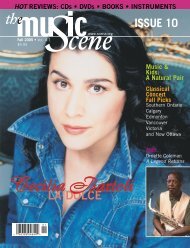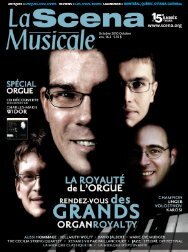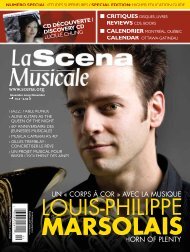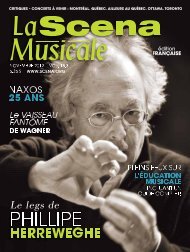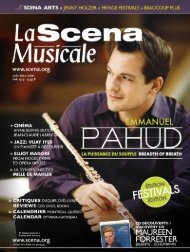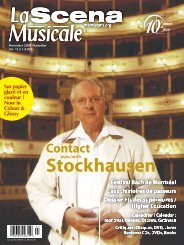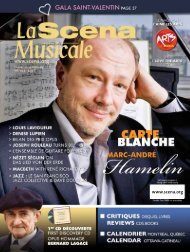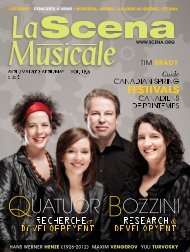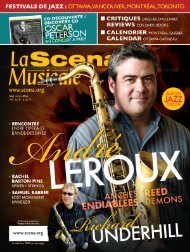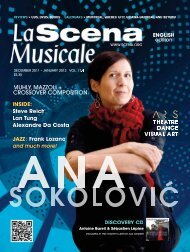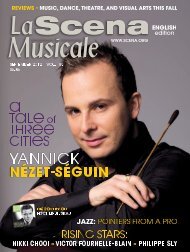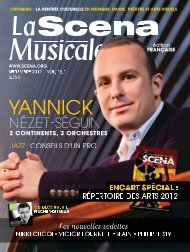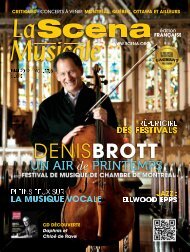The Bohlen-Pierce system - La Scena Musicale
The Bohlen-Pierce system - La Scena Musicale
The Bohlen-Pierce system - La Scena Musicale
You also want an ePaper? Increase the reach of your titles
YUMPU automatically turns print PDFs into web optimized ePapers that Google loves.
ON THE COVER VENGEROV<br />
“I FEEL VERY YOUNG AND NEW AGAIN,”<br />
says Vengerov. “<strong>The</strong> break I had was very<br />
recreational. Now I feel again like a new,<br />
promising violinist. Again I am in love with<br />
the violin.” <strong>The</strong> operative word here is ‘again.’<br />
<strong>The</strong> key to how such a star player, at the top of<br />
his game and young enough to have most of<br />
his career still stretching before him, can see<br />
an injury as a blessing has a lot to do with the<br />
stardom itself. Vengerov had been vigorously<br />
training on the violin since the age of four; he<br />
won his first international competition—the<br />
Wieniawski Competition (junior division)—by<br />
age ten. Years of accumulated labour and the<br />
weight of expectations, the shadowy underside<br />
of such stardom and success, had worn down<br />
his love for the violin. Vengerov told the London<br />
Times in April 2008 that he was fully<br />
healed. It took, then, less than a year for him<br />
to heal physically from his injury, but half a<br />
decade to rejuvenate mentally.<br />
Although he put down the violin, Vengerov<br />
did not stray from music. Vengerov launched<br />
into fulfilling his “longtime dream”: conducting.<br />
<strong>The</strong> death of his mentor Mstislav Rostropovich<br />
had been yet another blow in spring<br />
2007, and perhaps this turn to conducting was<br />
also an homage to the cellist-turned-conductor,<br />
a way of fully following in Rostropovich’s<br />
footsteps. He had already gotten some conducting<br />
training from Vag Papian in the late<br />
nineties and started studying with Yuri Simonov<br />
in 2006 but he focused with much<br />
greater seriousness on conducting when he<br />
stopped playing publicly. <strong>The</strong> same year he injured<br />
his shoulder he conducted a North<br />
American tour of the Verbier Festival Orchestra,<br />
which included a stop at Carnegie Hall. In<br />
June 2008 he was invited by Valery Gergiev<br />
to conduct the Mariinsky <strong>The</strong>atre Orchestra,<br />
one of many orchestras he conducted over he<br />
next several years (including the Toronto<br />
Symphony Orchestra and the Orchestre symphonique<br />
de Montréal).<br />
“Conducting is bigger,” says Vengerov. “It’s a<br />
whole different way of communication with<br />
the audience and the musicians of the orchestra.<br />
It’s not as lonely as violin playing; there is<br />
a human factor and this is the most interesting<br />
for me. Any orchestra can play by themselves<br />
but the conductor is there to be the leader, like<br />
the leader of the army forces—and we have to<br />
battle for music.”<br />
A STAR IS BORN IN SIBERIA<br />
Vengerov was born with music in his genes,<br />
and a desire to be centre stage developed soon<br />
after. As a toddler, he was upset when taken<br />
to see the Novosibirsk Philharmonic Symphony<br />
Orchestra. <strong>The</strong> orchestra might have<br />
tuned to his father, the principal oboist, but<br />
the audience could barely see him. So<br />
Vengerov wanted to play something in the<br />
string section that sat right at the front, and<br />
by age four he got his wish: he started studying<br />
the violin. By five he was learning with<br />
Galina Tourchaninova. He did not become her<br />
star pupil right away, however. At their first<br />
meeting he punched her in the stomach. During<br />
early lessons he refused to play. His<br />
mother started crying when told Tourchaninova<br />
would no longer continue after five lessons,<br />
and Vengerov astounded everyone by<br />
playing seventeen assigned pieces by memory.<br />
Vengerov was put on a strict schedule that<br />
saw him practice seven to eight hours after<br />
dinner. He kept up with this as he was eager to<br />
please his mother, who also enticed him with<br />
the promise of being able to ride his tricycle<br />
“after practicing,” although that meant at<br />
around three in the morning. Yet there were<br />
moments of bad temper, such as when he<br />
broke his bow in frustration. His family was<br />
far from well off and lived in a two-room basement.<br />
Siberia was filled with rations and badly<br />
heated winters. That Vengerov had a recognized<br />
talent and lessons with a famed teacher,<br />
that his father was able to get an old grand<br />
piano for them—even though they had to<br />
knock a hole through the wall and use the<br />
closed lid as a kitchen counter to make room—<br />
all this must have seemed too good to give up<br />
in order that Vengerov could play normal<br />
childhood games in the evenings. <strong>The</strong>re were<br />
harder sacrifices being made all around them<br />
in Soviet Russia.<br />
And the sacrifice was paying off. At seven,<br />
Vengerov enrolled at the Central Special Music<br />
School, enabling him and his grandparents to<br />
“Again I}<br />
am in love<br />
with the<br />
violin.”<br />
VENGEROV HAS PLAYED many priceless instruments.<br />
He currently plays the 1727 ex-<br />
Kreutzer Stradivarius, which was sold for a<br />
record-breaking price at an auction in<br />
1998, a 2004 made-to-order Samuel Zygmuntowicz<br />
viola, and a 2005 bright blue<br />
Violectra five-string electric violin.<br />
APRIL 2012 5



